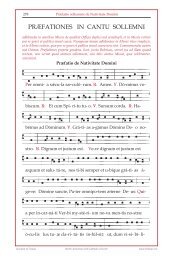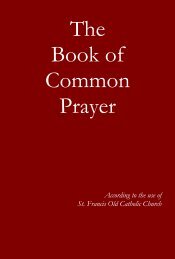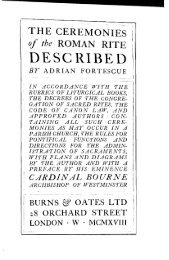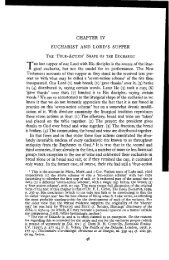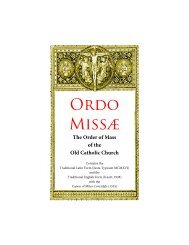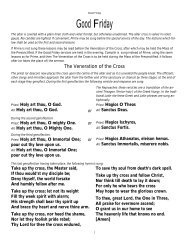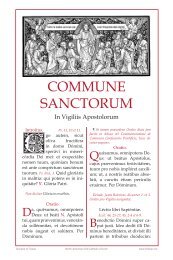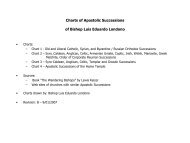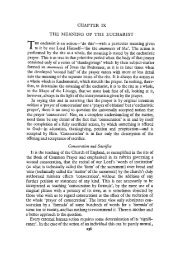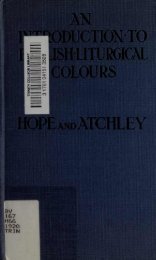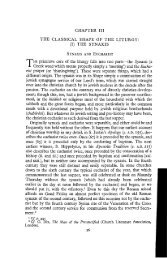Official Record of Apostolic Succession of
Official Record of Apostolic Succession of
Official Record of Apostolic Succession of
You also want an ePaper? Increase the reach of your titles
YUMPU automatically turns print PDFs into web optimized ePapers that Google loves.
Copying the example <strong>of</strong> Henry VIII <strong>of</strong> England, the government-imposed new Church constitution made The<br />
Czar the Head <strong>of</strong> The Church <strong>of</strong> Russia. It went further than King Henry, however, by providing for a Lay<br />
Procurator (a government <strong>of</strong>ficial) to administer The Church's day-to-day affairs. This "constitutional"<br />
subjugation <strong>of</strong> The Church to the Russian State established the precedent <strong>of</strong> direct governmental control<br />
over and interference in all the affairs <strong>of</strong> The Russian Orthodox Church -- a practice continued until the end<br />
<strong>of</strong> the 20 th century by the atheistical government <strong>of</strong> the U.S.S.R.<br />
After the overthrow <strong>of</strong> Czar Nikolai II in March <strong>of</strong> AD 1917, The Russian Orthodox Church immediately<br />
convened a national Sobor to reform The Church and revive the Patriarchate <strong>of</strong> Moscow, which Czar Peter<br />
The Great had suspended. Metropolitan Tikhon, who had earlier been Russian Archbishop in America, won<br />
the election and assumed the <strong>of</strong>fice <strong>of</strong> Patriarch <strong>of</strong> Moscow and All Russia in November <strong>of</strong> that year, almost<br />
simultaneously with the outbreak <strong>of</strong> the Communist Revolution. This All-Russian Council (Sobor) attempted<br />
to restore sobornost -- the active participation <strong>of</strong> the whole Church (bishops, clergy, and laity) in every<br />
aspect <strong>of</strong> the Church's life, in contrast to the bureaucratic centralization which had ruled The Church under<br />
the secular and <strong>of</strong>ten hostile government <strong>of</strong> Russia since the creation <strong>of</strong> The Holy Synod by Czar Peter The<br />
Great.<br />
The new reäctionary Communist government <strong>of</strong> Russia immediately placed severe restrictions upon the<br />
revitalized and reforming Church <strong>of</strong> Russia. In view <strong>of</strong> the vigorous anti-religion activities <strong>of</strong> the new Russian<br />
government, Patriarch Tikhon issued a statement in AD 1917 urging The Russian Faithful to act<br />
independently to preserve The Church. Some <strong>of</strong> the Bishops <strong>of</strong> The Russian Church attempted to heed The<br />
Patriarch's advice by establishing a separate independent Church administration in southeastern Russia.<br />
The advance <strong>of</strong> the Bolsheviks, however, forced these faithful shepherds into exile.<br />
In November <strong>of</strong> 1920 these refugee Bishops organized The Supreme Church Administration for<br />
Churches Outside <strong>of</strong> Russia in Istanbul (Constantinople), with the approval <strong>of</strong> The Öcumenical Patriarch.<br />
At the invitation <strong>of</strong> The Patriarch <strong>of</strong> Serbia, The Supreme Church Administration moved to Yugoslavia.<br />
Twelve <strong>of</strong> these Bishops, with representatives <strong>of</strong> the clergy and laity, organized a Sobor at Sremski<br />
Karlovtsi, Yugoslavia, on 21 November to 2 December 1921, under the presidency <strong>of</strong> Anthony Khrapovitski,<br />
Metropolitan <strong>of</strong> Kiev and Galich and under the canonical authority <strong>of</strong> an ukase (i.e., an Edict having the force<br />
<strong>of</strong> law) issued in AD 1920 by Patriarch Tikhon. The result <strong>of</strong> this meeting was the organization <strong>of</strong> The<br />
Russian Orthodox Church Outside Russia, sometimes called The Synodal Church.<br />
Patriarch Tikhon, who vigorously opposed the inhumane and atheistic policies <strong>of</strong> the revolutionary regime,<br />
was cruelly imprisoned on 9 May 1922. The Communists refused to permit an election for his successor<br />
when he died in AD 1925. Metropolitan Petr <strong>of</strong> Krutica became Locum Tenes (Patriarchal Vicar), but he, too,<br />
was almost immediately imprisoned. He was succeeded later that year by Sergii, the Metropolitan <strong>of</strong> Nizhni-<br />
Novgorod, who tried to make peace with the new Soviet government. Although he suffered temporary<br />
imprisonment (December AD 1926 to April 1927), he issued a declaration in July <strong>of</strong> AD 1927 changing The<br />
Church's <strong>of</strong>ficial stance towards the Communist government from one <strong>of</strong> hostility to one <strong>of</strong> praise and<br />
coöperation. Outside observers have called this declaration <strong>of</strong> The Metropolitan either the great betrayal or<br />
the great salvation <strong>of</strong> The Russian Church.<br />
The Russian Orthodox Church Outside Russia naturally disapproved <strong>of</strong> the coöperation between the<br />
Patriarchal Church and the atheistic Communist government in Russia, as first formulated in the letters<br />
issued by Metropolitan (later Patriarch) Sergii in AD 1926 and AD 1927. Because <strong>of</strong> the inappropriate<br />
influence seemingly exercised by the anti-religious government <strong>of</strong> Russia, The Russian Orthodox Church<br />
Outside Russia refused to recognize The Patriarch <strong>of</strong> Moscow and All Russia in any way on the grounds<br />
that the Communist government completely controlled the patriarchate.<br />
With the invasion <strong>of</strong> Mother Russia by the Nazis (Russia's former ally in the partition <strong>of</strong> Poland at the<br />
beginning <strong>of</strong> World War II), the political climate changed in Moscow. Metropolitan Sergii urged The Faithful<br />
to sincerely support the Russian war effort against the Nazis; he issued calls to arms, organized fund raising<br />
rallies, and did everything possible to ensure the protection <strong>of</strong> his people and the defense <strong>of</strong> The Church. By<br />
1 October 1944 The Church had donated 150,000,000 rubles, as well as gifts "in kind," to the Communist<br />
government. These many sacrifices and contributions for Russia gained him the favorable attention <strong>of</strong> the<br />
then current Communist Dictator, Josef Stalin, who finally granted the Metropolitan's request for new<br />
patriarchal elections. Sergii was elected Patriarch on 7 September 1943; he unfortunately died within six<br />
months. After that The Kremlin permitted subsequent elections within a year <strong>of</strong> each vacancy and had made<br />
The Orthodox Church <strong>of</strong> Russia one <strong>of</strong> the few <strong>of</strong>ficially recognized Christian organizations in the Soviet



